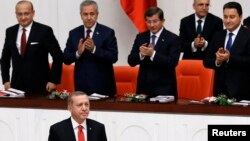Turkish President Recep Tayyip Erdogan declared Wednesday that the fight against the Islamic State group and other extremist groups has become Turkey's top priority.
But Erdogan’s declaration comes as Ankara faces criticism it has failed to take a clear stand against the jihadist group.
Analysts said one of the key ways Turkey may be helping the Islamic State fighters is by not cracking down on the smuggling of the Islamic State group’s oil into Turkey.
'Nature of such conflicts'
International relations expert Soli Ozel of Istanbul’s Kadir Has University said such concerns are deserved.
"We have plenty of eyewitness reports. We have testimony from locals who are engaged in it, or at least witnessing it. It's the nature of such conflicts if something is to be smuggled, it will be.” Ozel said.
“If the Syrians had diamonds, then you would be smuggling diamonds. If they had gold, they would be smuggling gold. If they have oil, they will be smuggling oil. It's the nature of the beast, I am sure there is lot of credence to this, and Turkey’s denials have not really been accepted by Turkish allies,” he added.
Criticism over Turkey’s alleged tacit role with the jihadist group has been growing in Washington.
During hearings last month by the Senate Foreign Relations committee, Democratic Senator Ed Markey made it clear to U.S. Secretary of State John Kerry that Turkey’s alleged role in the trade was unacceptable.
"It's unconscionable that Turkey has become the principal source of funding for ISIL [another name for Islamic State fighters],” Markey said.
“If we can shut that down, we do almost immeasurable damage to their ability to finance this war. I just think we have to put Turkey right front and center and have the world say to them, they must stop,” he added.
Denies criticisms, allegations
Ankara has angrily denied allegations that it is failing to curtail the Islamic State group's oil smuggling trade.
Turkey’s Energy Minister Taner Yildiz said this week his country would never partake in any illegal transactions.
A senior Turkish official, speaking on condition of anonymity, said security forces were stepping up their actions to stop the trade. The official said those efforts have already met with success, saying that 78 million liters of contraband oil was seized last year by authorities.
In the first six months of this year, 58 million liters have been seized.
The official admitted there were no figures available for the Syrian border region.
The dispute between Turkey and its Western allies is an indication of a wider issue of a lack of clarity over Ankara’s stance toward the jihadist group, said Cengiz Aktar of Istanbul’s Suleyman Sah University.
Test for Turkey
And, Aktar said, its position on oil smuggling will be an important test.
"Turkey should have a clear attitude now, a clear position vis-a-vis all these rumors and speculations,” Aktar said. “One thing for sure is that these guys [Islamic State militants] are getting money, getting funds from oil sales. What counts in the eyes of the coalition and of the United States is the deed not the words."
U.S. President Barrack Obama has made clear that cutting off the flow of revenue to the Islamic State group is a key part of the coalition’s efforts to defeat it.
With Turkey sharing a nearly 900-kilometer border with Syria, much of it under jihadist control, experts said Turkey’s cooperation will be key in those efforts.




